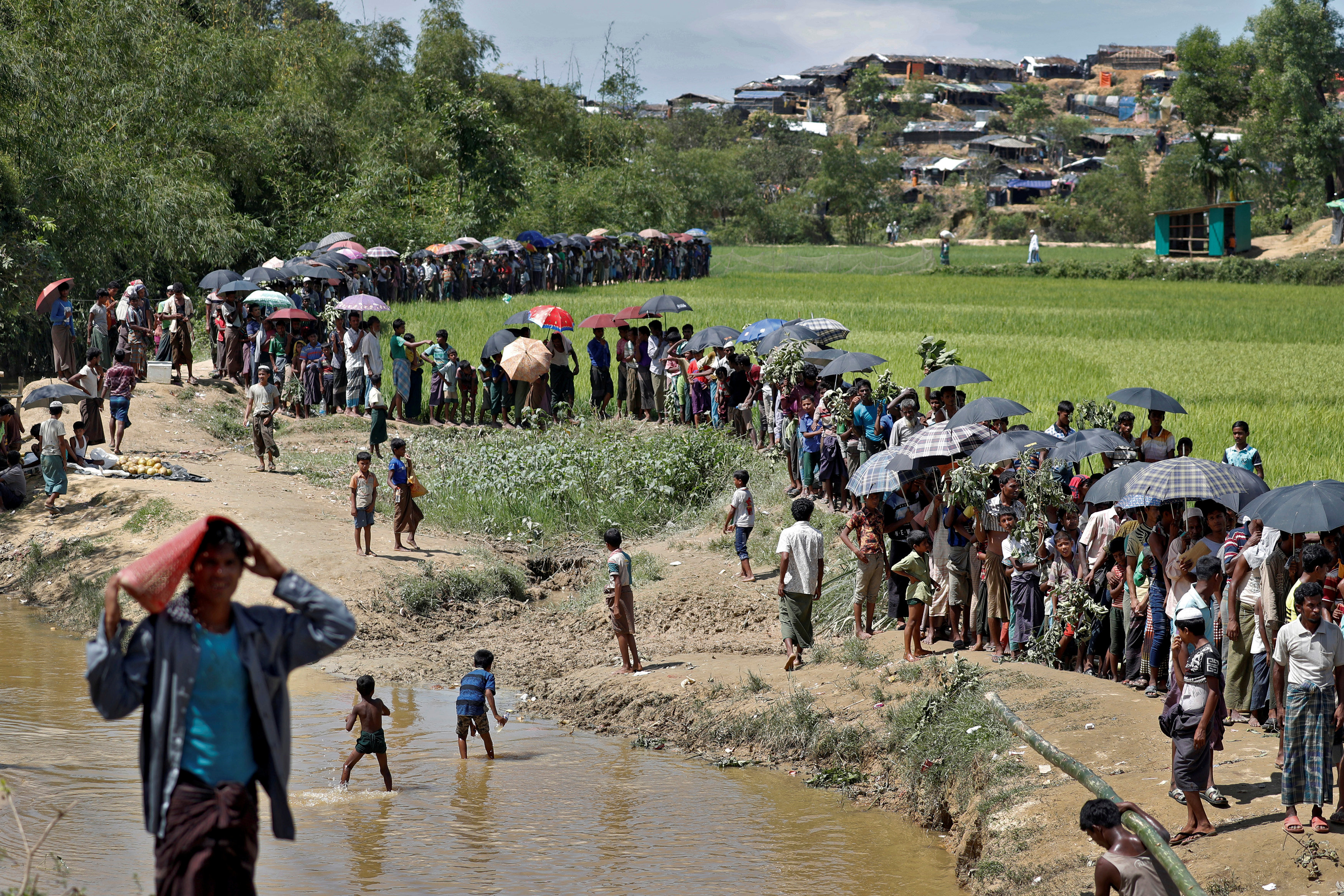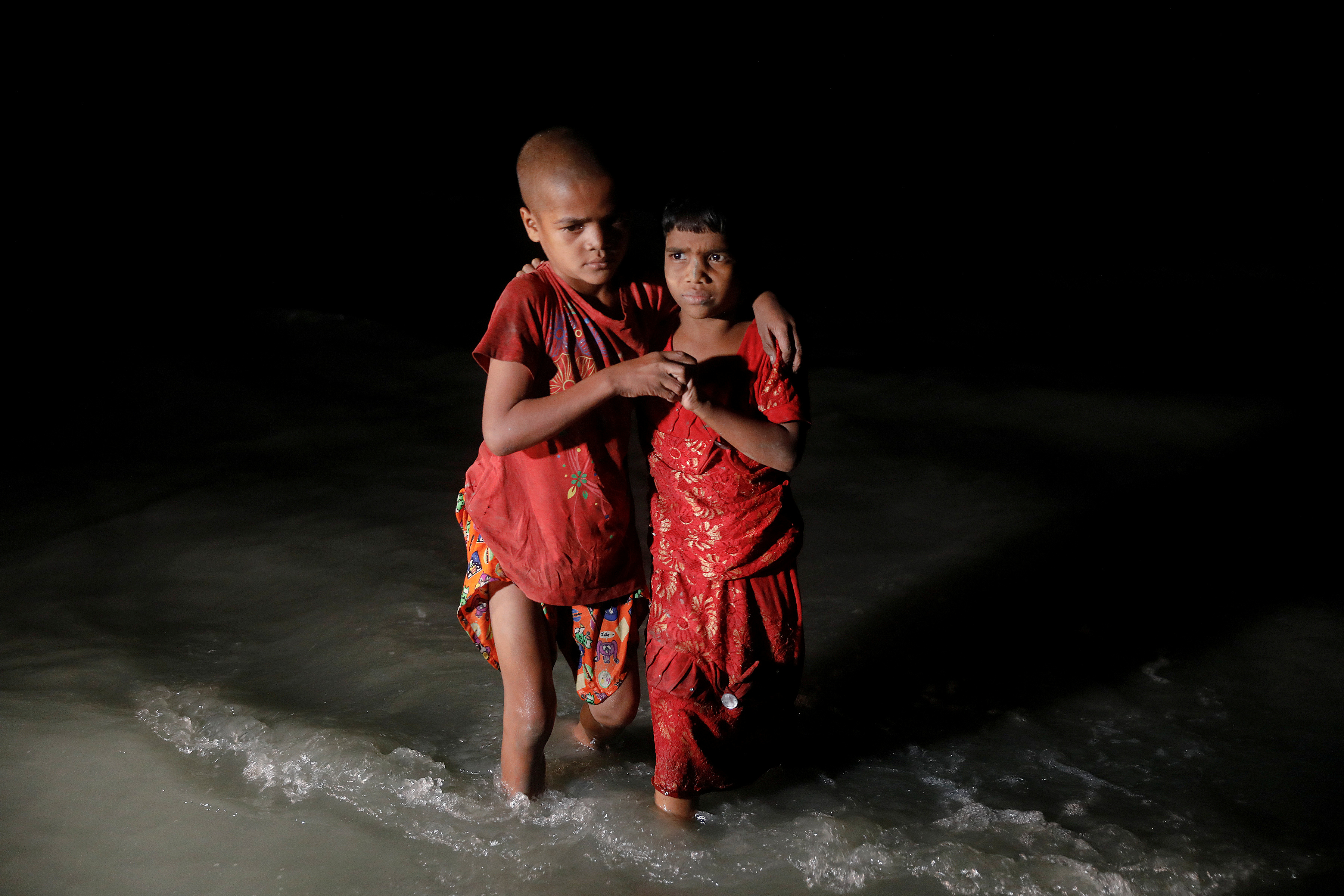
By Rahul Bhatia
COX’S BAZAR, Bangladesh (Reuters) – Rohingya Muslims in Bangladesh were skeptical on Tuesday about their chances of ever going home to Myanmar, even though the government there has given an assurance it would accept people verified as refugees.
More than half a million Rohingya have fled from a Myanmar military crackdown in Rakhine State launched in late August that has been denounced by the United Nations as ethnic cleansing.
Myanmar denies ethnic cleansing, saying it is fighting Rohingya terrorists who have claimed attacks on the security forces. The government has said anyone verified as a refugee will be allowed to return under a process set up with Bangladesh in 1993.
Bangladesh and Myanmar agreed on Monday to work on a repatriation plan, and a Myanmar government spokesman confirmed it would go along with it, provided people could verify their status with paperwork.
But many refugees in camps in Bangladesh are scornful.
“Everything was burned, even people were burned,” said a man who identified himself as Abdullah, dismissing the chances that people would have documents to prove a right to stay in Myanmar.
At the root of the problem is the refusal by Buddhist-majority Myanmar to grant citizenship to members of a Muslim minority seen by a mostly unsympathetic, if not hostile, society as interlopers from Bangladesh.
Though Myanmar has not granted Rohingya citizenship, under the 1993 procedure, it agreed to take back people who could prove they had been Myanmar residents.
But a day after Bangladesh and Myanmar announced apparent progress, a Bangladeshi foreign ministry official appeared resigned to a difficult process.
“This is still a long procedure,” said the official, who declined to be identified as he was not authorized to speak to media.
There were already nearly 400,000 Rohingya refugees in Bangladesh before the latest exodus, but Myanmar had said it would only accept, “subject to verification”, those who arrived after October 2016, when a military offensive in response to Rohingya insurgent attacks sent 87,000 Rohingya fleeing to Bangladesh, the Bangladeshi official said.
“We said that many Rohingya refugees have no documents, so this process should be flexible. Myanmar said they will decide who will get involved in the verification,” the official said, adding that Bangladesh wanted international agencies to be involved.
Myanmar’s government spokesman said under the 1993 pact, even a hospital record was enough to prove residency, but it was only Myanmar, not Bangladesh, that could verify citizenship.
“We have a policy for the repatriation process and we will go along with that,” the spokesman, Zaw Htay, told Reuters.
‘BREAK THEIR PROMISE’
But even if refugees have documents, many are wary about returning without an assurance of full citizenship, which they fear could leave them vulnerable to the persecution and curbs they have endured for years.
Amina Katu, 60, laughed at the thought of returning.
“If we go there, we’ll just have to come back here,” she said. “If they give us our rights, we will go, but people did this before and they had to return.”
Last month, Anwar Begum told Reuters she had fled from Myanmar three times. The first time was to escape a 1978 crackdown, and she returned the following year. She fled again in 1991 and returned in 1994.
“I don’t want to go back,” the 55-year-old added. “I don’t believe the government. Every time the government agrees we can go back, then we’re there and they break their promise.”
Investigators appointed by government leader Aung San Suu Kyi and led by former U.N. secretary-general Kofi Annan recommended in August that Myanmar review a 1982 law that links citizenship and ethnicity and leaves most Rohingya stateless.
U.N. High Commissioner for Refugees Filippo Grandi told a meeting in Geneva on Monday that the link between statelessness and displacement was nowhere more evident than with the Rohingya.
“Denial of citizenship is a key aspect of the discrimination and exclusion that have shaped their plight,” he said.
Grandi called for a two-track approach to tackle issues of citizenship and rights and inclusive development to stamp out poverty in Rakhine State.
Separately, the U.N. refugee agency and Bangladesh authorities are working to contain an outbreak of diarrhoeal diseases in the camps, UNHCR spokesman Andrej Mahecic told a briefing in Geneva.
Refugees are still crossing into Bangladesh, though at a slower rate, a spokesman for the International Organisation for Migration said. A Reuters photographer saw smoke plumes on the Myanmar side of the border but it was not clear what was alight.
Rights groups say more than half of more than 400 Rohingya villages in the north of Rakhine State have been torched.
Myanmar officials have said they have attempted to reassure groups of fleeing Rohingya but they could not stop people who were not citizens from leaving.
(Additional reporting by Ruma Paul in DHAKA, Tommy Wilkes in COX’S BAZAR, Shoon Naing in NAYPYITAW, Stephanie Nebehay and Tom Miles in GENEVA; Writing by Robert Birsel; Editing by Clarence Fernandez)










